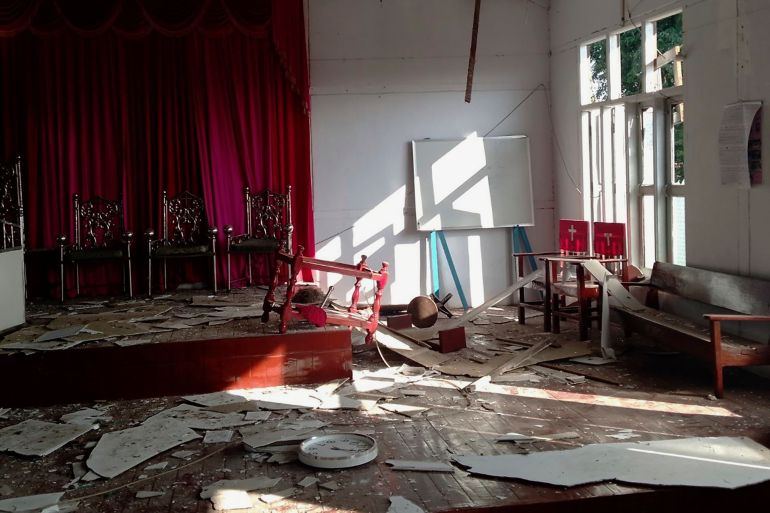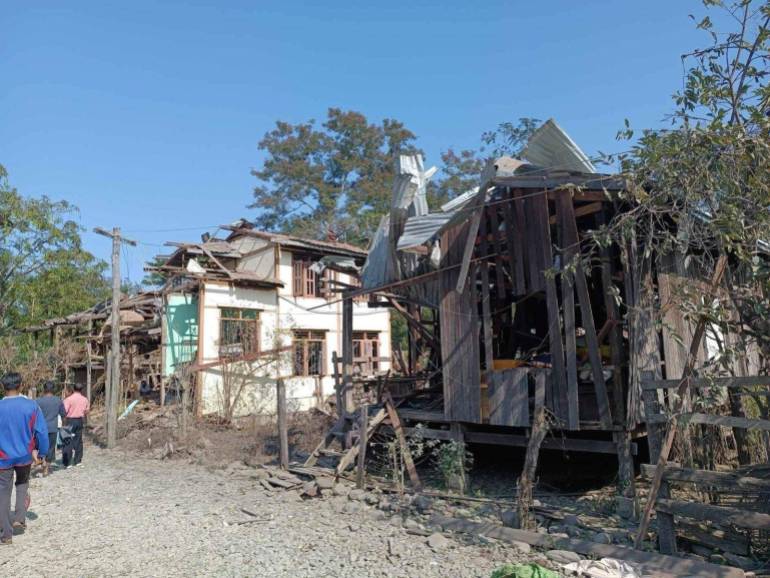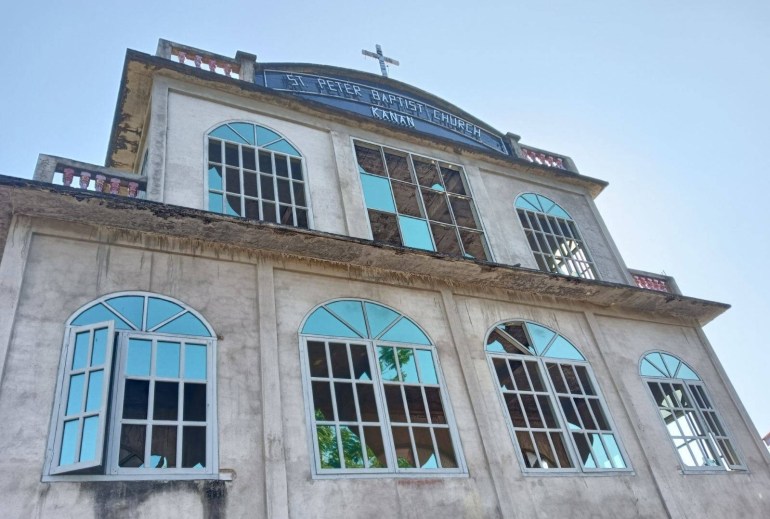Amnesty calls for war crimes probe over Myanmar military bombing of church
The January attack in Sagaing killed 17 villagers, including nine children, as they attended a Sunday service.

Myanmar’s military should be investigated for war crimes over an air attack last month that killed 17 villagers, including nine children, as they attended a Sunday church service, Amnesty International has said.
Amnesty said photo and video analysis, as well as interviews with witnesses, indicated the Myanmar air force had dropped bombs on three locations near the St Peter Baptist Church in Kanan village on the morning of January 7.
Keep reading
list of 4 itemsDozens of Rohingya refugees flee Malaysian immigration detention centre
‘Blood and sweat’: Myanmar resistance fights to overturn military coup
Myanmar military extends state of emergency, vows to ‘crush’ opposition
The village is in the Sagaing region, not far from Myanmar’s border with India.
At least 20 people were injured.
The damage is “consistent with air strikes”, the rights group said in a statement on Thursday. “The combined photo and video evidence indicates at least three impact locations, with craters consistent with aircraft bombs of approximately 250kg each.”
The Myanmar military has previously denied responsibility for the attack, claiming no aircraft were operating in the area at the time.
But Amnesty said a review of video taken during the strikes showed the “distinctive swept-wing silhouette of an A-5 fighter jet flying over the village”, noting that only the military flies the China-made aircraft. Moreover, satellite imagery from the Tada-U airbase near Mandalay showed active A-5 operations on the airfield while plane spotters had reported the takeoff, flight and landing of an A-5 consistent with that morning’s attack on Kanan.
“The Myanmar military’s deadly attacks on civilians show no signs of stopping,” said Matt Wells, the director of Amnesty’s crisis response programme. “These attacks must be investigated as war crimes and the UN Security Council should refer the situation in Myanmar to the International Criminal Court (ICC). The perpetrators of these crimes under international law must be brought to justice.”

Myanmar was plunged into crisis three years ago when the generals seized power from the elected government of Aung San Suu Kyi triggering mass protests that evolved into armed resistance after the military responded with brutal force.
At least 4,485 civilians have been killed since the coup, and violence has become increasingly widespread.
Sagaing has been notorious for brutal assaults by the military, which has launched air attacks and burned villages as part of its long-held strategy known as “four cuts” that aims to separate its opponents from their potential civilian supporters.
At the time of the church attack, Kanan village was under the control of a unit of the People’s Defence Force (PDF), an anti-coup armed group established by the National Unity Government of lawmakers removed in the coup and pro-democracy activists.
‘Toothless statements’
There are growing calls for the international community to do more to address the deteriorating situation in Myanmar where the United Nations estimates at least 2.6 million people have been forced from their homes by the fighting and millions are in need of humanitarian assistance.
Although the United States and its allies have imposed some sanctions, the response has largely been left to the Association of Southeast Asian Nations (ASEAN), a regional grouping that Myanmar joined in 1997.
ASEAN agreed to the so-called Five Point Consensus to end the violence at an emergency meeting with Myanmar army chief Senior General Min Aung Hlaing in April 2021, but the military regime has ignored the agreement and the bloc has done little to make it comply.
“The crisis in Myanmar is escalating rapidly and the Myanmar people urgently need support and protection from the UN Security Council,” Marzuki Darusman, a member of the Special Advisory Council on Myanmar (SAC-M) and former chair of the UN Independent International Fact-Finding Mission on Myanmar, said in a statement on Wednesday following a closed-door session of the council.
Before the meeting, nine members of the 15-member council issued a statement calling on the military to end its attacks on civilians and civilian infrastructure and free all political prisoners, including Aung San Suu Kyi.
“It is simply not good enough for the Security Council to issue toothless statements and defer to an even more toothless ASEAN. The junta must face justice for its deplorable acts,” Darusman added.

Fellow SAC-M member Chris Sedoti said the Security Council should have referred Myanmar to the ICC long ago.
“If it can’t, or won’t, then others must act to finally bring the perpetrators of grave international crimes in Myanmar to justice through the ICC or a special tribunal,” said Sedoti, who was also part of the fact-finding mission.
In 2018, the mission called for the investigation and prosecution of Min Aung Hlaing and his top military leaders for genocide, crimes against humanity and war crimes over its treatment of several ethnic and religious minorities in Rakhine, Kachin and Shan states, including the mostly Muslim Rohingya.
The SAC-M was set up after the coup by a group of international independent experts to support the people of Myanmar in their fight for justice and accountability.